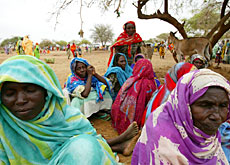Professor champions rights of displaced people
Swiss law professor Walter Kälin has a huge task as United Nations Secretary-General Kofi Annan's new representative on internally displaced persons (IDPs).
Kälin, who has a long record of human rights advocacy, told swissinfo how he plans to represent the estimated 25 million IDPs worldwide.
The Bern University professor of constitutional and international public law is the second Swiss legal expert to be nominated to a high-profile UN position this year.
Nicolas Michel, an international law specialist at Fribourg University, was named in May as under-secretary-general for legal affairs and UN legal counsel.
swissinfo: How did you become involved in human and refugee rights?
Walter Kälin: A mixture of practical and academic experiences set me on this path.
While I was preparing my thesis, I worked for Amnesty International in their asylum and refugee section. So I was in direct contact with victims of human rights abuses and I learnt a lot from what happened to them.
I was able to combine this experience with my academic pursuits and my thesis focused on refugee rights.
swissinfo: Your work brings you into contact with a lot of human grief and distress. How do you handle these powerful emotions?
W.K.: It’s not easy. In 1991, I was the UN’s special rapporteur on human rights in Kuwait under Iraqi occupation. I spent two weeks in Kuwait after the first Gulf War questioning victims. What I saw has weighed on my mind to this day.
A professional attitude and the importance of this work help you overcome all the distress you feel.
swissinfo: Was your nomination related to the Darfur crisis in Sudan?
W.K:: No. Francis Deng, a Sudanese professor who had held the position since it was created in 1992, had reached the end of his mandate.
I worked closely with him over the years. My nomination was probably due to the fact that I could pursue his work and that I was well acquainted with the issues.
Deng and I tried to define the rights of IDPs according to international law. And we were able to draft some guiding principles.
swissinfo: What are these principles?
W.K.: The central point is outlawing arbitrary expulsions. People are often forced to leave their homes by the state or insurgents because they are members of an ethnic or religious minority.
We also want to ensure the rights of people who have already been displaced and are waiting to return.
Internally displaced children, for example, often fall victim to armed groups, who recruit them as child soldiers. And displaced women don’t just suffer from discrimination; they are also victims of attacks since they don’t have the protection of their male family members in the camps where they live.
And IDPs lose their voting rights in many countries because they are only allowed to vote where they normally live.
The final point concerns itself with returning home. People must be able to decide themselves if they want to go back home – when circumstances allow it – or stay put.
swissinfo: What is specific to the status of IDPs compared with “normal” refugees?
W.K.: IDPs are in the same position as refugees, to the extent that they have been forced to flee their homes, villages and towns, to escape from persecution and attacks. The only difference is that they haven’t left the country.
But there is no international convention to protect their rights. Refugees on the other hand benefit from a convention that allows them to request asylum and the UN’s High Commissioner for Refugees can defend them.
swissinfo: What will your job actually involve?
W.K.: I have different duties. First of all, I must promote implementation of the guiding principles for the protection of IDPs. These guidelines are not legally binding, but I would like to convince states to recognise them.
I will also travel to affected countries to evaluate the situation there and make recommendations not only to the local authorities, but also to the UN and its agencies, to improve the lives of IDPs.
Finally, I will evaluate to what extent nations respect the rights of these internal refugees.
swissinfo: How will the difficulties faced by internally displaced people be alleviated by your work?
W.K.: I want to implement human rights diplomacy, based both on convincing authorities and applying political pressure. I hope that at least in some cases I will be able to convince governments and organisations to do something to improve the situation of IDPs.
I also want to work on the legal basis for IDP rights. I want to see laws that don’t just contain political rhetoric, but also ensure the rights of people who have been forced to leave everything behind.
swissinfo-interview: Renat Künzi
There are approximately 25 million IDPs around the world.
The biggest numbers are to be found in Colombia (3.5 million), the Democratic Republic of Congo (3.4 million), the Caucasus region, Turkey and Iraq.
There are another 500,000 IDPs in western Sudan’s Darfur region.
Walter Kälin is an internationally recognised expert on human and international law.
In 1991-1992, he was the UN’s special rapporteur on human rights in Kuwait.
Since 2003, he has been a member of the UN Human Rights Committee.
He expects to spend two to three months a year on his new mandate as secretary-general Kofi Annan’s representative on the human rights of internally displaced persons.

In compliance with the JTI standards
More: SWI swissinfo.ch certified by the Journalism Trust Initiative













You can find an overview of ongoing debates with our journalists here . Please join us!
If you want to start a conversation about a topic raised in this article or want to report factual errors, email us at english@swissinfo.ch.